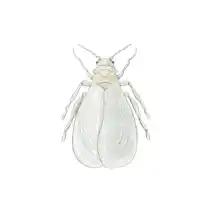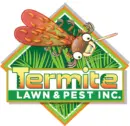Blow Fly
Name: 𝘊𝘢𝘭𝘭𝘪𝘱𝘩𝘰𝘳𝘪𝘥𝘢𝘦
Size: ~6 to 16 mm
Characteristics: Shiny, metallic coloring. Shades of blue, green, and black. Robust and somewhat hairy bodies. Three-segmented, bristle-like antennae. Veiny wings.
Locations: Frequently found outdoors in environments with dead animals, roadkill, or decaying plant matter. May also infest open wounds of living animals or animal waste. Places where animals are kept: farms, slaughterhouses, veterinary clinics, or pet shelters. May also enter buildings in search of food or suitable breeding sites. Can be attracted to indoor environments by the scent of rotting food.
Deer Fly
Name: 𝘊𝘩𝘳𝘺𝘴𝘰𝘱𝘴
Size: ~7 to 10 mm
Characteristics: Varies in color from yellow to black. Has large purple or black prominent eyes marked with fluorescent green lines. Dark patches on wings. Six legs. Short, three-segmented antennae.
Locations: Wooded areas with dense vegetation (forests, wooded trails, and parks). Also prevalent in grassy fields and meadows, especially those near water sources (rivers, lakes, or marshes) which provide suitable breeding sites. Lays its eggs on overhanging foliage or aquatic vegetation directly over water. May be encountered on hiking trails. Attracted to livestock, such as cattle and horses, as potential hosts for blood meals. Significant population on farms and in agricultural areas.
Drain Fly
Name: 𝘗𝘴𝘺𝘤𝘩𝘰𝘥𝘪𝘥𝘢𝘦
Size: ~1.5 to 5 mm
Characteristics: Light brown to gray in color. Has a moth-like appearance. Looks furry due to body covered in small hairs. Has two pairs of wings. Parallel veins on wings. Exhibits erratic movements when in flight. Entire life cycle typically lasts around 20 days.
Locations: Typically nocturnal. Often attracted to light sources. Inhabits moist environments such as drains and sewage systems. Frequently found in bathrooms, particularly around sinks, showers, and bathtubs. May also be found in kitchens near sinks, garbage disposals, and floor drains. Food residue and moisture in these areas provide suitable conditions for breeding. May also inhibit laundry rooms and basements.
Fruit Fly
Name: 𝘋𝘳𝘰𝘴𝘰𝘱𝘩𝘪𝘭𝘢 𝘮𝘦𝘭𝘢𝘯𝘰𝘨𝘢𝘴𝘵𝘦𝘳
Size: ~3.175 mm
Characteristics: Oval. Yellow to pale brown in color. Bright red eyes. Six legs.
Locations: Attracted to overripe fermenting fruit and vegetables. Anywhere with organic waste: kitchens, restaurants, bars, grocery stores, fruit markets, salad bars, buffet areas, wine or beer tasting areas, dumpsters, trash receptacles.
Gnat
Name: 𝘚𝘤𝘪𝘢𝘳𝘪𝘥𝘢𝘦
Size: ~3 mm
Characteristics: Small and delicate. Dark brown body. Dusky wings. Small head. Rounded, moderately prominent eyes. Thread-like antennae. Comparatively long legs and wings. Resembles tiny mosquitoes rather than common flies.
Locations: Greenhouses and outdoor garden beds with moist, wet soil. Also infests indoor potted plants with too moist soil. Also inhabits compost piles or areas with decaying organic matter (basements and cellars).
House Fly
Name: 𝘔𝘶𝘴𝘤𝘢 𝘥𝘰𝘮𝘦𝘴𝘵𝘪𝘤𝘢
Size: ~19.05 to 31.75 mm
Characteristics: Has gray or yellowish-colored bodies with dark midline markings on the abdomen and irregular dark markings on the sides. Usually has reddish eyes. Has sponging mouthparts. Female is typically larger than male.
Locations: Often found in and around homes, especially in areas where food is present (kitchens, dining areas, garbage cans, pet food dishes, etc). Also commonly found outdoors, particularly in areas with organic waste (compost piles, garbage bins, and pet waste areas). Well-adapted to urban environments.
No See Um
Name: 𝘊𝘦𝘳𝘢𝘵𝘰𝘱𝘰𝘨𝘰𝘯𝘪𝘥𝘢𝘦
Size: <3.175 mm
Characteristics: Typically gray in color. Two wings have dense hairs. Has well-developed mouthparts with cutting teeth.
Locations: Requires moisture for its development. Often found near bodies of water (streams, ponds, lakes, and springs). Forested or wooded areas with decaying organic matter (Rotting fruit, tree holes, and slime-covered bark) where larvae can develop. Primarily an outdoor insect, but may occasionally enter residential areas.
Whitefly
Name: 𝘈𝘭𝘦𝘺𝘳𝘰𝘥𝘪𝘥𝘢𝘦
Size: ~1.58 mm
Characteristics: Light yellowish or greenish. May have a fringe of wax filaments.
Locations: Infests gardens, ornamental shrubs, vegetables, flowers, and fruit trees. Houseplants can also be susceptible to infestation. Agricultural fields with tomatoes, cotton, and cucumbers.

.
Termite Lawn and Pest, Inc
4524 Parkway Commerce Blvd
Orlando, Florida 32808
Phone: (407) 447-7378
